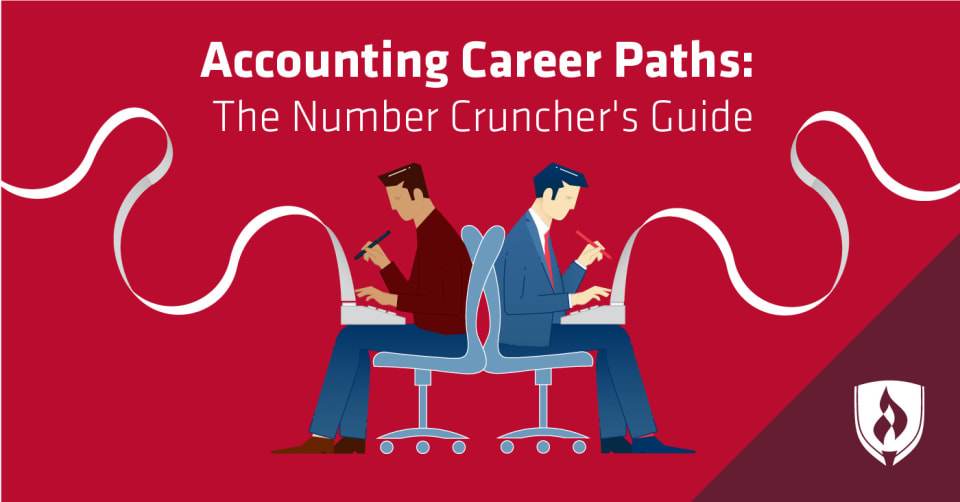
Choosing a degree that is right for you is challenging. But finding one that meets your needs while raising a family is just as important. While you want to study something you’re passionate about, you can’t help but think about the impact it will have on your family and future.
If you’re considering a career in accounting, then you’re likely already trying to calculate the return on investment (ROI) of earning a degree. You want to ensure you’ll be able to launch a long and rewarding career after graduating. A big part of that is knowing what lies ahead as you progress through the different levels of accounting careers.
We used a combination of real-time job data, government information and expert insight to help you envision your accounting career path. This guide will give you a better understanding of what to expect as you forecast your future in accounting.
Your accounting career path: Getting started
The first step on any accounting career path is to acquire the appropriate education. Accounting is a complex field, so this should come as no surprise. Aspiring accountants have the option of earning an Associate’s degree or a Bachelor’s degree, but the latter will open up more doors for your long-term career.
We used real-time job analysis software to examine more than 238,000 accounting job postings from 2017.* The data indicates that an overwhelming 98 percent of employers prefer accounting candidates have a Bachelor’s degree.
Not only will your degree choice determine the number of jobs for which you’ll qualify, but it will also determine the types of jobs for which you’ll qualify, according to Kari Grittner, Accounting program coordinator for the Rasmussen University School of Business. She says an Associate’s degree can help land you an entry-level position, such as in bookkeeping or data entry. But earning a Bachelor’s degree is the key to helping you advance past entry-level jobs.
Your accounting career path: Entry-level accounting jobs
Earning your degree is just the first step to becoming an accountant. You also have to choose whether you’d like to work in public or private accounting. Public accountants work with a variety of clients to prepare financial documents that an individual or corporation is required to disclose to the public. Private accountants work internally within a company to manage their financial documents.
Both focus areas have pros and cons—public accounting jobs come with yearly busy seasons that require long hours, while private accounting may have less opportunities to advance or specialize. Deciding between public versus private accounting is an important choice, so be sure to do your research.
Once you make your decision, the next step is landing that first job. The good news is there are a handful of options for entry-level accountants. Our analysis of job postings helped us identify the top job titles for accountants with two years or fewer of experience.*
Here are the most common job titles we found:
- Staff accountant
- Junior accountant
- Accounts payable / accounts receivable clerk
- Financial analyst
- Audit associate
Any of these positions would be a great first step in the accounting field. Once you’re in, you’ll begin gaining the experience and industry know-how to advance on your accounting career path.
Your accounting career path: Mid-level accounting jobs
One of the benefits of working in accounting is that there are opportunities to work your way up the corporate ladder. Once you have some professional experience under your belt, you can start exploring more advanced positions.
Our job analysis helped us identify some of the most common accounting job titles for professionals with between two and eight years of experience:*
- Accounting manager
- Cost accountant
- Accounting analyst
- Controller
- Audit manager
As you might expect, these mid-level accounting roles start to branch out in terms of responsibilities. You may choose to specialize in cost accounting or tax accounting. Or perhaps you decide to move into a more supervisory role where you oversee the work of junior accountants. Many accounting professionals never progress past this tier of occupations, but there are plenty of specialties and focus areas that will allow you to grow professionally.
Your accounting career path: Senior-level accounting jobs
After working and proving yourself as an accountant for nine or more years, your experience managing and leading could put you in contention for some of the most coveted positions in the industry. While it’s true not every accountant will break through into a senior-level accounting role, it’s good to know what lies ahead and what to strive for.
For many public accountants, becoming a partner in a public accounting firm is one of the ultimate destinations. For private accountants, becoming a chief financial officer (CFO) is often the top of the corporate ladder.
Our job analysis helped us identify these other common accounting job titles for professionals with at least nine years of experience in the field:
- Senior accountant
- Accounting manager
- Audit director
- Tax manager
- Accounting analyst
These senior-level positions obviously carry a lot of responsibility, but you can expect to be appropriately compensated for your expertise.
Where will your accounting career path take you?
This overview should give you a better idea of where a degree in Accounting could lead you. Knowing you have a variety of opportunities and room to grow should give you the confidence you need to take the next step in launching your new career.
If you’re confident that accounting is the career for you, then there’s no point in waiting to get started. Start planning your next move by reading our article, “Your Step-by-Step Guide on How to Become an Accountant.”
Related Articles:
- What Is a Fiduciary? Understanding This Important Financial Advisor Distinction
- Why a Day in the Life of a CPA is More Interesting Than You Think
*Burning-Glass.com (analysis of 238,292 accounting jobs, Jan. 1, 2017 – Dec. 31, 2017)
EDITOR’S NOTE: This article was originally published in August 2015. It has since been updated to include information relevant to 2018.




